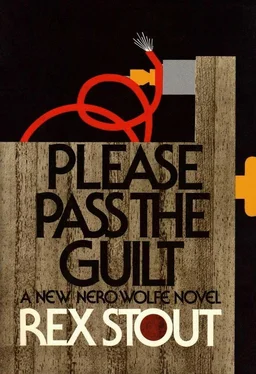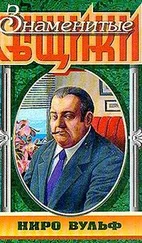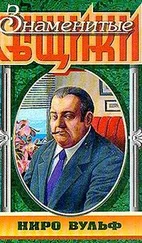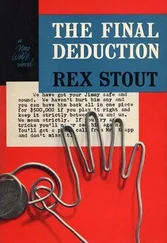Rex Stout
Please Pass the Guilt
He grunted — the low brief rumble that isn’t meant to be heard — turned his head to dart a glance at me, and turned back to Dr. Vollmer, who was in the red leather chair facing the end of Wolfe’s desk.
It wasn’t just that he was being asked for a favor. It there was a man alive who could say no to a request for a favor easier than Nero Wolfe, I hadn’t met him. The trouble was that it was Dr. Vollmer, whose house and office was only a few doors away, who had said he wanted one, and the favor score between him and us was close to a tie. So Wolfe was probably going to be stuck, and therefore the grunt.
Vollmer crossed his long, lean legs and rubbed his narrow, lean jaw with a knuckle. “It’s really for a friend of mine,” he said, “a man I would like to oblige. His name is Irwin Ostrow, a psychiatrist — not a Freudian. He’s interested in a new approach to psychiatric therapy, and he’s working at it. Crisis intervention, they call it. I’ll have to explain how it works. It’s based on—”
“First aid,” Wolfe said. “Emotional tourniquet.”
“How — you know about it?”
“I read. I read for various purposes, and one of them is to learn what my fellow beings are up to. There are several thousand emergency-treatment centers now operating in this country. The Detroit Psychiatric Institute has a Suicide Prevention Center. The crisis center at Grady Memorial Hospital in Atlanta is staffed by psychiatrists, nurses, social workers, lay therapists, and clergymen. The director of clinical psychiatry at San Francisco General Hospital has written and spoken at length about it. His name is Decker.”
“What’s his first name?”
“Barry.”
Vollmer shook his head. “You know,” he said, “you are the most improbable combination of ignorance and knowledge on earth. You don’t know what a linebacker does. You don’t know what a fugue is.”
“I try to know what I need to know. I make sure to know what I want to know.”
“What if it’s unknowable?”
“Only philosophers and fools waste time on the unknowable. I am neither. What does Dr. Ostrow want to know?”
Vollmer slid back in the red leather chair, which was deep. “Well. I don’t want to bore you with things you already know. If I do, stop me. The Washington Heights Crisis Clinic is on 178th Street, near Broadway. It’s a storefront operation; people can just walk in, and they do. A woman who can’t stop beating her two-year-old daughter. A man who keeps getting up in the middle of the night and going outdoors in his pajamas. Most of them are on the way to a mental hospital if they’re not headed off quick, and the clinic — but you know all that. Eight days ago, a week ago yesterday, a young man came and told a nurse he needed help and she sent him in to Irwin — Dr. Ostrow. He gave the nurse his name, Ronald Seaver.”
Vollmer looked at me with his brows up. “I hope they don’t have to go to a crisis clinic,” I said, and turned to Wolfe. “One of your ignorance areas, baseball. Ron Swoboda is an outfielder and Tom Seaver is a pitcher. ‘Ron Seaver’ is obviously a phony, but it might help to know he’s a Met fan, if a clue is needed.”
“It is,” Vollmer said. “Of course Irwin knew it was an alias, but people often do that their first visit. But he came back five days later, Saturday morning, and again the next day, Sunday, and he not only hasn’t told his real name, he won’t give any facts at all except what his crisis is. It’s blood on his hands. His hands get covered with blood, not visible to anybody else, and he goes and washes them. The first time, ten days ago — no, twelve — it was in the middle of the night and he had to go to the bathroom and wash his hands. It happens any time, no pattern, day or night, but usually when he’s alone. A nurse there says it’s the Lady Macbeth syndrome. He says he knows of no event or experience that could have caused it, but Irwin is sure he’s lying.”
He turned a palm up. “So that’s his crisis. Irwin says he really has one, a severe one; the possibility of a complete mental breakup is indicated. But they can’t get through to him. One of Irwin’s colleagues there is a woman, a lay therapist, who has had remarkable success with some tough ones, even catatonics, but after two hours with him — that was Sunday, day before yesterday — she told him he was wasting his time and theirs. Then she said she had alternative suggestions: either he could go to a surgeon and have his hands amputated, or he could go to a detective, perhaps Nero Wolfe, and try to dodge his questions. And do you know what he said? He said, ‘I’ll do that. I’ll go to Nero Wolfe.’”
My brows were up. “He tried to,” I said. “So that was Ron Seaver. He phoned yesterday around noon and said he wanted to come and pay Nero Wolfe a hundred dollars an hour to ask him questions. He wouldn’t give his name and didn’t mention bloody hands. Naturally I thought he was a nut and said no and hung up.”
Vollmer nodded. “And he phoned Irwin and Irwin phoned me.” To Wolfe: “Of course the hundred dollars an hour wouldn’t tempt you, but I didn’t come to tempt you, I came to ask a favor for a friend. You said you make sure to know what you want to know. Well, Dr. Ostrow thinks it’s possible that this man did have blood on his hands, and he wants to know if he can and should be helped. I admit I do too. I’ve dealt with people in crises myself, any doctor has, but this is a new one to me.”
Wolfe looked at the wall clock. Twenty minutes to seven. “Will you dine with us? Shad roe Creole. Fritz uses shallots instead of onion and no cayenne. Chablis, not sherry.”
Vollmer smiled, broad. “Knowing how few people get invited to your table, I should beam. But I know it’s only compassion for my—”
“I am not compassionate.”
“Hah. You think my meals are like the one Johnson described to Boswell: ‘ill-killed, ill-dressed, ill-cooked, and ill-served,’ and you feel sorry for me. Thank you, but I have things to do before I eat. If I could come tomorrow and bring that man...”
Wolfe made a face. “Not for dinner. I suppose he’ll see Dr. Ostrow tomorrow, or telephone. If he does, tell him to come tomorrow evening at nine o’clock. There will be no fee. And no compassion.”
That was Tuesday, the third of June. The next morning there was a little problem. When we haven’t got a job or jobs going, I usually get out for a walk after breakfast, with or without an excuse like a trip to the bank, but that Wednesday I didn’t. I don’t know if I have ever mentioned that the three employees of the Midtown Home Service Corporation who come once a week are always male because Wolfe insists on it. That Wednesday Andy and Sam came at nine o’clock as usual, but they had a woman along, a husky coal-black female with shoulders nearly as broad as mine. Andy, who was white but broad-minded, explained that it was tougher than ever to get men, and repeated one of his favorite remarks, “Goddam it, TV men and carpet layers work in homes.” He called the woman Lucile and started her on the dining room, across the hall from the office on the ground floor of the old brownstone. Of course Wolfe, up in the plant rooms on the roof for his morning session with the orchids, hadn’t seen her. I went back to the kitchen, sat at my little breakfast table for my second cup of coffee, and told Fritz, “We’ll tell him it’s a man in disguise because he’s wanted.”
“There’s batter for another cake, Archie.”
“No, thanks. They’re extra good, they always are, but I’ve had five. He’s wanted for peddling pot. Or maybe acid.”
Читать дальше












